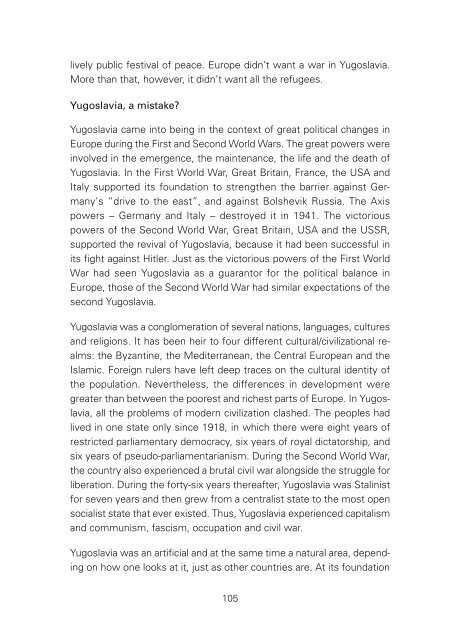The Contribution of Women to Peace and Reconciliation
The Contribution of Women to Peace and Reconciliation
The Contribution of Women to Peace and Reconciliation
Create successful ePaper yourself
Turn your PDF publications into a flip-book with our unique Google optimized e-Paper software.
lively public festival <strong>of</strong> peace. Europe didn’t want a war in Yugoslavia.<br />
More than that, however, it didn’t want all the refugees.<br />
Yugoslavia, a mistake?<br />
Yugoslavia came in<strong>to</strong> being in the context <strong>of</strong> great political changes in<br />
Europe during the First <strong>and</strong> Second World Wars. <strong>The</strong> great powers were<br />
involved in the emergence, the maintenance, the life <strong>and</strong> the death <strong>of</strong><br />
Yugoslavia. In the First World War, Great Britain, France, the USA <strong>and</strong><br />
Italy supported its foundation <strong>to</strong> strengthen the barrier against Germany’s<br />
“drive <strong>to</strong> the east”, <strong>and</strong> against Bolshevik Russia. <strong>The</strong> Axis<br />
powers – Germany <strong>and</strong> Italy – destroyed it in 1941. <strong>The</strong> vic<strong>to</strong>rious<br />
powers <strong>of</strong> the Second World War, Great Britain, USA <strong>and</strong> the USSR,<br />
supported the revival <strong>of</strong> Yugoslavia, because it had been successful in<br />
its fight against Hitler. Just as the vic<strong>to</strong>rious powers <strong>of</strong> the First World<br />
War had seen Yugoslavia as a guaran<strong>to</strong>r for the political balance in<br />
Europe, those <strong>of</strong> the Second World War had similar expectations <strong>of</strong> the<br />
second Yugoslavia.<br />
Yugoslavia was a conglomeration <strong>of</strong> several nations, languages, cultures<br />
<strong>and</strong> religions. It has been heir <strong>to</strong> four different cultural/civilizational realms:<br />
the Byzantine, the Mediterranean, the Central European <strong>and</strong> the<br />
Islamic. Foreign rulers have left deep traces on the cultural identity <strong>of</strong><br />
the population. Nevertheless, the differences in development were<br />
greater than between the poorest <strong>and</strong> richest parts <strong>of</strong> Europe. In Yugoslavia,<br />
all the problems <strong>of</strong> modern civilization clashed. <strong>The</strong> peoples had<br />
lived in one state only since 1918, in which there were eight years <strong>of</strong><br />
restricted parliamentary democracy, six years <strong>of</strong> royal dicta<strong>to</strong>rship, <strong>and</strong><br />
six years <strong>of</strong> pseudo-parliamentarianism. During the Second World War,<br />
the country also experienced a brutal civil war alongside the struggle for<br />
liberation. During the forty-six years thereafter, Yugoslavia was Stalinist<br />
for seven years <strong>and</strong> then grew from a centralist state <strong>to</strong> the most open<br />
socialist state that ever existed. Thus, Yugoslavia experienced capitalism<br />
<strong>and</strong> communism, fascism, occupation <strong>and</strong> civil war.<br />
Yugoslavia was an artificial <strong>and</strong> at the same time a natural area, depend -<br />
ing on how one looks at it, just as other countries are. At its foundation<br />
105








